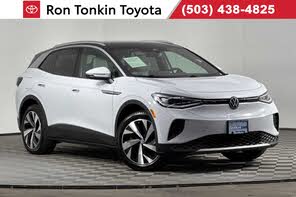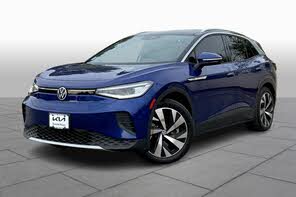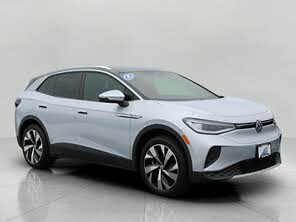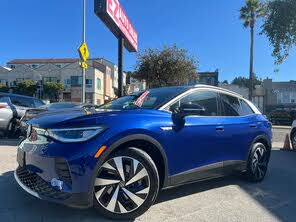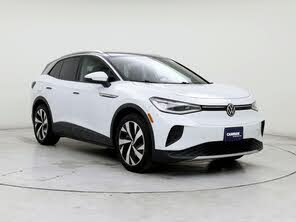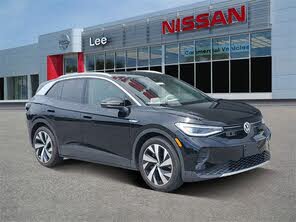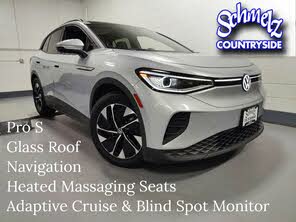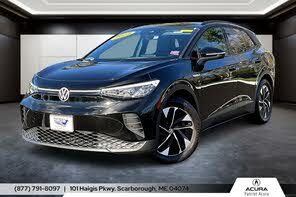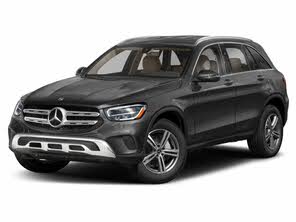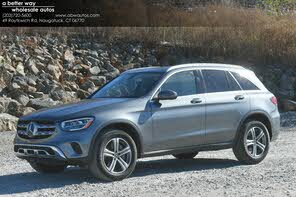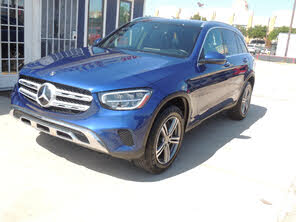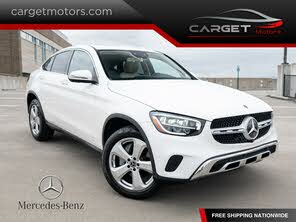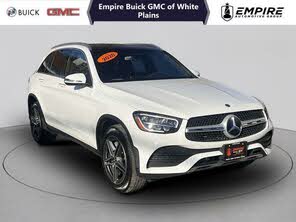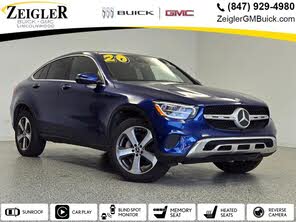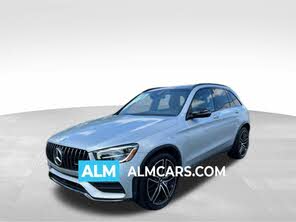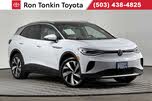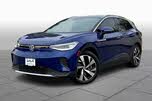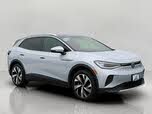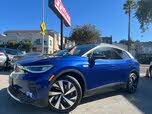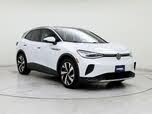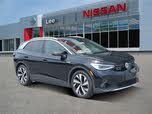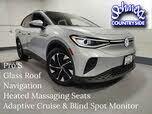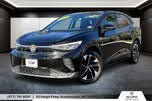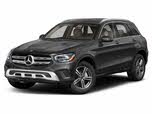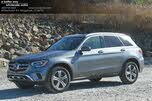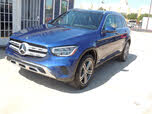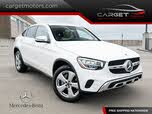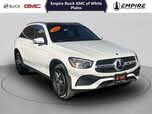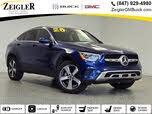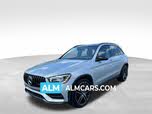2021 Volkswagen ID.4 vs 2020 Mercedes-Benz GLC
Overview | |
MSRP$42,500 | MSRP$39,995 |
Average price$28,626 | Average price$23,374 |
Listings775 | Listings167 |
Ratings & Reviews | |
User Reviews | User Reviews |
Expert reviews7.3 out of 10 | Expert reviews7.3 out of 10 |
Pros
| Pros
|
2020 Mercedes-Benz GLC Reviews SummarySuburbs mean a lot to Mercedes. Company research is dead set on an American future of growing megacities, which feed growing mega-suburbs underserved by mass transit—basically, all the places we’re moving to now to escape absurdly high mortgages and rents in places like New York and San Francisco. The car Mercedes executives think you’ll be buying in these super suburbs won’t be an autonomous electric car. It’ll be another version of its top-selling car in the US, the compact GLC crossover. | |
2021 Volkswagen ID.4 Reviews SummaryThe “Dieselgate” emissions scandal forced Volkswagen to double down on electric cars, and now we’re finally seeing the first result of that: the 2021 Volkswagen ID.4 electric crossover. VW has made an electric car before, but its last attempt, the e-Golf, was built to satisfy emissions standards, not rack up sales. It was barely advertised, and it was sold only in certain states. That’s not the case with the ID.4, which will be available nationwide and will even be built in Tennessee starting in 2022. Volkswagen views the ID.4 as a rival not to other EVs, but to mainstream gasoline vehicles like the Honda CR-V and Toyota RAV4. Being late to the party means there are already several other EVs trying to coax new-car buyers away from internal combustion, however. If you want a reasonably-priced EV, the Nissan Leaf, Hyundai Kona Electric, and Kia Niro EV already exist, and General Motors just announced the 2022 Chevrolet Bolt EUV—a new variant of the Chevy Bolt EV with a crossover body style similar to the Volkswagen. We tested an ID.4 1st Edition, which commemorates the car’s launch, and an ID.4 PRO S with all-wheel drive (AWD). The 1st Edition is a limited-edition model that has already sold out, but it’s mechanically identical to the ID.4 Pro S AWD, albeit with power sent only to the rear wheels. | |
Popular Features & Specs | |
Engine2.0L 255 hp I4 | Engine201 hp Electric |
Drive TrainRWD | Drive TrainRWD |
Seating Capacity5 | Seating Capacity5 |
Horsepower255 hp @ 5800 rpm | Horsepower |
EV Battery Capacity | EV Battery Capacity82 kWh |
MPG City22 | MPG City104 |
MPG Highway29 | MPG Highway89 |
Battery Charge Time (240V) | Battery Charge Time (240V)8 hours |
Engine | |
Engine Name2.0L 255 hp I4 | Engine Name201 hp Electric |
Torque273 lb-ft @ 1800 rpm | Torque |
Horsepower255 hp @ 5800 rpm | Horsepower |
Battery Charge Time (240V) | Battery Charge Time (240V)8 hours |
DrivetrainRWD | DrivetrainRWD |
Fuel Economy | |
EV Battery Capacity | EV Battery Capacity82 kWh |
MPG City22 | MPG City104 |
MPG Highway29 | MPG Highway89 |
Interior | |
Seating Capacity5 | Seating Capacity5 |
Safety | |
Front Crash Overall | Front Crash Overall5 |
Side Crash Overall5 | Side Crash Overall5 |
Dimensions & Capacity | |
Cargo Space19.4 cu ft | Cargo Space30.3 cu ft |
Curb Weight3889 lbs | Curb Weight4517 lbs |
Height65.5 in | Height64.4 in |
Length183.8 in | Length180.5 in |
Width82.5 in | Width72.9 in |
Wheelbase113.1 in | Wheelbase108.9 in |
Maximum Payload1182 lbs | Maximum Payload1347 lbs |
Number of doors4 | Number of doors4 |
Maximum Towing Capacity3500 lbs | Maximum Towing Capacity |
Overview | ||
MSRP | $42,500 | $39,995 |
Average price | $28,626 | $23,374 |
Listings | ||
Ratings & Reviews | ||
User reviews | ||
Expert reviews | 7.3 out of 10Read full review | 7.3 out of 10Read full review |
Pros & cons | Pros
| Pros
|
Summary | Suburbs mean a lot to Mercedes. Company research is dead set on an American future of growing megacities, which feed growing mega-suburbs underserved by mass transit—basically, all the places we’re moving to now to escape absurdly high mortgages and rents in places like New York and San Francisco. The car Mercedes executives think you’ll be buying in these super suburbs won’t be an autonomous electric car. It’ll be another version of its top-selling car in the US, the compact GLC crossover. | The “Dieselgate” emissions scandal forced Volkswagen to double down on electric cars, and now we’re finally seeing the first result of that: the 2021 Volkswagen ID.4 electric crossover. VW has made an electric car before, but its last attempt, the e-Golf, was built to satisfy emissions standards, not rack up sales. It was barely advertised, and it was sold only in certain states. That’s not the case with the ID.4, which will be available nationwide and will even be built in Tennessee starting in 2022. Volkswagen views the ID.4 as a rival not to other EVs, but to mainstream gasoline vehicles like the Honda CR-V and Toyota RAV4. Being late to the party means there are already several other EVs trying to coax new-car buyers away from internal combustion, however. If you want a reasonably-priced EV, the Nissan Leaf, Hyundai Kona Electric, and Kia Niro EV already exist, and General Motors just announced the 2022 Chevrolet Bolt EUV—a new variant of the Chevy Bolt EV with a crossover body style similar to the Volkswagen. We tested an ID.4 1st Edition, which commemorates the car’s launch, and an ID.4 PRO S with all-wheel drive (AWD). The 1st Edition is a limited-edition model that has already sold out, but it’s mechanically identical to the ID.4 Pro S AWD, albeit with power sent only to the rear wheels. |
Video | ||
Popular Features & Specs | ||
Engine | 2.0L 255 hp I4 | 201 hp Electric |
Drive Train | RWD | RWD |
Seating Capacity | 5 | 5 |
Horsepower | 255 hp @ 5800 rpm | |
EV Battery Capacity | 82 kWh | |
MPG City | 22 | 104 |
MPG Highway | 29 | 89 |
Battery Charge Time (240V) | 8 hours | |
Engine | ||
Engine Name | 2.0L 255 hp I4 | 201 hp Electric |
Torque | 273 lb-ft @ 1800 rpm | |
Horsepower | 255 hp @ 5800 rpm | |
Battery Charge Time (240V) | 8 hours | |
Drivetrain | RWD | RWD |
Fuel Economy | ||
EV Battery Capacity | 82 kWh | |
MPG City | 22 | 104 |
MPG Highway | 29 | 89 |
Interior | ||
Seating Capacity | 5 | 5 |
Safety | ||
Front Crash Overall | 5 | |
Side Crash Overall | 5 | 5 |
Dimensions & Capacity | ||
Cargo Space | 19.4 cu ft | 30.3 cu ft |
Curb Weight | 3889 lbs | 4517 lbs |
Height | 65.5 in | 64.4 in |
Length | 183.8 in | 180.5 in |
Width | 82.5 in | 72.9 in |
Wheelbase | 113.1 in | 108.9 in |
Maximum Payload | 1182 lbs | 1347 lbs |
Number of doors | 4 | 4 |
Maximum Towing Capacity | 3500 lbs | |
The 2020 Mercedes-Benz GLC featured a new front fascia with a trapezoidal grille and angled LED headlights, echoing the aggressive design cues of the A-Class and CLS-Class. The taillights had square LEDs within the same housing, making the differences from previous models subtle unless compared side-by-side. While the GLC wasn't unattractive, it lacked visual excitement from most angles, especially in the mass-market GLC 300 model. The AMG versions, with their wide tires, vertical-bar grille, and lower stance, added some visual drama, and the GLC Coupe’s fastback roof brought a touch of flair. However, the beige paint and 18-inch wheels of the test car made it blend into parking lots, despite its over $60,000 price tag.
What truly set the GLC apart was its interior, which was among the best in the business. The all-black interior with stained gray ash wood was luxurious, featuring a continuous sweep of wood from the air vents, padded and stitched leather on the seats and doors, and cold metal speaker covers. The fit, finish, and overall quality were impeccable. The 2020 model introduced a standard 10.3-inch touchscreen, replacing the older, smaller displays, and a new touchpad on the console. The steering wheel, identical to the one in the E-Class, had more buttons and felt thicker and softer. A 12.3-inch display could replace the analog gauges, and the previously aligned shiny buttons for various functions were replaced by a blank plate.
The 2021 Volkswagen ID.4 was designed as an EV from the ground up, featuring a distinctive look that set it apart from Volkswagen’s gasoline models. It had a streamlined profile with wheels pushed out to the corners, avoiding the fake toughness of the Tiguan and Atlas crossovers. The ID.4 was based on VW’s EV-specific MEB platform, following the European-market ID.3 hatchback. While it shared some design elements with the ID.3, the ID.4’s SUV-like styling was less pronounced, making it look more like a hatchback than a traditional SUV.
The interior of the ID.4 blended Volkswagen’s minimalism with a smartphone aesthetic, featuring piano black and matte plastic. The base ID.4 Pro came with a leather-wrapped steering wheel and cloth seats, while the Pro S and 1St Edition models had leatherette upholstery. The cabin felt spacious, with good forward visibility despite the steeply-raked windshield. However, rearward visibility was compromised by thick rear pillars and a small back window. The ID.4 lacked a “frunk” for extra cargo storage, but VW claimed this decision allowed for more cabin space. The console was narrow and close to the floor, providing limited storage space for larger items.
The 2020 Mercedes-Benz GLC 300 came with a new turbocharged inline 4-cylinder engine, producing 255 horsepower and 273 pound-feet of torque. The 9-speed automatic transmission, available in rear-wheel drive (RWD) or 4Matic all-wheel drive (AWD), was reprogrammed for better performance. The GLC 300 felt more responsive than previous models, holding gears longer and downshifting earlier. However, the engine still fell short compared to competitors like the BMW X3. The AMG GLC 43, with its twin-turbo 3.0-liter V6 engine producing 385 horsepower and 384 pound-feet of torque, offered phenomenal performance. The AMG GLC 63 4Matic Coupe and AMG GLC 63 S 4Matic Coupe, with their twin-turbo V8 engines, provided even more power, but the GLC 43 was fast enough for most drivers.
The GLC 300’s steering and handling were disappointing, with body roll, vague steering, and sloppy suspension control. The AMG models, with their electronic locking rear differential, AMG-tuned adaptive dampers, and air suspension, offered better handling. The GLC 300’s fuel economy was EPA-rated at 21 mpg city, 28 highway, and 24 combined, while the AMG models had lower ratings. A plug-in hybrid GLC 350e was expected to arrive in 2020.
The 2021 Volkswagen ID.4 launched with a single rear-mounted electric motor, producing 201 horsepower and 229 pound-feet of torque, powered by an 82-kilowatt-hour battery pack. It was the first RWD Volkswagen passenger car sold in the U.S. since the Beetle. An AWD version, with a second electric motor, arrived later in 2021, increasing power to 295 horsepower and 339 pound-feet of torque. The RWD setup provided balanced handling, while the AWD version offered more power and traction.
The ID.4 was tuned for comfort rather than sporty handling, with a smooth ride over bumps but noticeable body roll in corners. The electric motor provided instantaneous torque, making acceleration fun, but the car wasn’t designed for aggressive driving. Volkswagen chose not to implement aggressive regenerative braking, opting for a more familiar driving experience with friction brakes. The ID.4’s fuel efficiency and range were competitive with other EVs in its class.
The 2020 Mercedes-Benz GLC featured a mix of digital and physical controls, with a steep learning curve for new Mercedes drivers. The column shifter required an upward tap for Reverse and a downward tap for Drive, while seat controls were located on the doors. The Mercedes-Benz User Experience (MBUX) system, with its touchscreen, thumb pad, and touchpad, became intuitive with practice. The GLC had enough room for four adults, but the back seat’s reclining mechanism was cumbersome. Cargo space was 19 cubic feet behind the rear seats and 57 cubic feet with them folded, less than competitors like the BMW X3.
The 2021 Volkswagen ID.4 offered more front and rear headroom than competitor EVs, but legroom was average for the segment. The Honda CR-V and Toyota RAV4 provided more rear headroom and legroom. The ID.4 had 30.3 cubic feet of cargo space with the rear seats in place and 64.2 cubic feet with them folded, more than other EVs but less than the CR-V and RAV4. The ID.4 lacked a “frunk,” but the cabin felt spacious, with good forward visibility. The console was narrow, providing limited storage space for larger items. The ID.4’s seats were comfortable, but the driver’s seat lacked thigh support.
The 2020 Mercedes-Benz GLC’s MBUX system included advanced features like augmented reality for navigation, a cloud-based voice assistant, and AI-based suggestions. The system could steer and brake itself on the highway for short periods, but these features were limited in functionality. The touchscreen was well-positioned, and Apple CarPlay and Android Auto were standard. An Off-Road Engineering Package added hill-descent control and underbody shields, but the GLC wasn’t designed for serious off-roading.
The 2021 Volkswagen ID.4’s standard infotainment system included a 10-inch touchscreen (with a 12-inch screen optional), wireless Apple CarPlay and Android Auto, and a 5.3-inch display screen for the instrument cluster. Haptic touchpads replaced most switchgear, but they were difficult to use without looking. The natural-language voice-control system responded to the prompt “Hello ID” and allowed for easy adjustments, but it was slow to respond. The ID.Light feature communicated information to the driver through a light strip at the base of the windshield. The touchscreen was well-positioned, with smart-looking graphics and easy-to-navigate menus.
The 2020 Mercedes-Benz GLC was named a 2019 Top Safety Pick+ by the IIHS and received a 5-star rating from the NHTSA. New for 2020 was Exit Warning Assist, which used blind-spot-monitoring radar sensors to detect approaching cyclists or cars. Other features included Pre-Safe Sound, which played “pink noise” to protect eardrums in a crash, and Predictive Brake Priming, which moved the brake pads closer to the discs in anticipation of hard braking.
The 2021 Volkswagen ID.4 received the highest-level Top Safety Pick+ designation from the IIHS and a 5-star rating from the NHTSA for the RWD model. Standard driver aids included forward-collision warning, automatic emergency braking, blind-spot monitoring, lane-keep assist, park distance control, automatic high beams, and adaptive cruise control. New features for 2021 included Travel Assist, which added automated lane centering to adaptive cruise control, and Emergency Assist, which brought the car to a stop if the driver was incapacitated.
CarGurus highlights

According to CarGurus experts, the overall rating for the 2020 Mercedes-Benz GLC is 7.3 out of 10, while the 2021 Volkswagen ID.4 scores 7.3 out of 10. Both vehicles offer unique advantages, but the final recommendation depends on your priorities. If you value a luxurious interior and advanced technology, the Mercedes-Benz GLC is a strong choice. However, if you prefer a modern EV with a spacious cabin and advanced safety features, the Volkswagen ID.4 is the better option.
Choose the 2021 Volkswagen ID.4 if:
- You want a distinctive, modern EV design with a spacious cabin.
- You prefer a comfortable ride with good handling balance.
- You value advanced driver aids and safety features.
Choose the 2020 Mercedes-Benz GLC if:
- You prioritize a luxurious and high-quality interior.
- You want advanced technology features like augmented reality navigation.
- You prefer a vehicle with a strong safety record and innovative safety features.
CarGurus highlights

According to CarGurus experts, the overall rating for the 2020 Mercedes-Benz GLC is 7.3 out of 10, while the 2021 Volkswagen ID.4 scores 7.3 out of 10. Both vehicles offer unique advantages, but the final recommendation depends on your priorities. If you value a luxurious interior and advanced technology, the Mercedes-Benz GLC is a strong choice. However, if you prefer a modern EV with a spacious cabin and advanced safety features, the Volkswagen ID.4 is the better option.
Choose the 2021 Volkswagen ID.4 if:
Shop Now- You want a distinctive, modern EV design with a spacious cabin.
- You prefer a comfortable ride with good handling balance.
- You value advanced driver aids and safety features.
Choose the 2020 Mercedes-Benz GLC if:
Shop Now- You prioritize a luxurious and high-quality interior.
- You want advanced technology features like augmented reality navigation.
- You prefer a vehicle with a strong safety record and innovative safety features.

By: CarGurus + AI
At CarGurus, our team of experienced automotive writers remain at the heart of our content operation, conducting hands-on car tests and writing insightful guides that are backed by years of industry experience. To complement this, we are harnessing AI to make our content offering more diverse and more helpful to shoppers than ever. To achieve this, our AI systems are based exclusively on CarGurus content, ratings and data, so that what we produce is both unique to CarGurus, and uniquely helpful to car shoppers.












